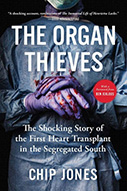The Organ Thieves: The Shocking Story of the First Heart Transplant in the Segregated South

Author: Chip Jones
Publisher: Gallery Books: Jeter Publishing, 2020. 390 pages.
Reviewer: Clarence Spigner | September 2022
Medical racism and American’s market-oriented health care system are not strange bedfellows, but intimate partners, in sustaining inequalities of health. In 1982, Paul Starr’s prize-winning The Social Transformation of American Medicine chronicled America’s health care industry as capitalist enterprise with “professional sovereignty.” His now 40-year-old treatise remains required reading. Harriet Washington’s Medical Apartheid: The Dark History of Medical Experimentation from Colonial Times to the Present, published in 2006, provides a backdrop to “race” and racism within the history of American bio-medical research. Numerous other health scholars, among them Ezekiel Emanuel in Reinventing American Health Care published in 2014, point out how advances in medical technology do not equate to health equity or health equality, which lead to continual inherit socio-economic or racial divide.
Organ transplantation crosses a racial divide. Whether “race” is viewed as a biological or as a social construct can conveniently be considered without much difference in bio-medical research. The overlap of “race” and medicine jumped from the pseudo-science practice of biological racism in the 19th century, into the 20st century in which “people of color” are treated as a source of “spare parts” (which is the title of the 1992 book by Renee C. Fox and Judith P. Swazey called Spare Parts: Organ Replacement in American Society). Fox and Swazey, while not mentioning race per se, make a highly pervasive and moral argument about the medical profession and American culture’s constructed fascination with organ replacement.
Chip Jones’ The Organ Thieves: The Shocking Story of the First Heart Transplant in the Segregated South, steps into this racial divide. The power of the medical elite is at the core of Jones’s excellent articulation, spanning from 19th and early 20th Century grave-robbing to teaching gross anatomy in medical schools. Lindsey Fitzharris, in The Butchering Art: Joseph Lister’s Quest to Transition the Gristly World of Victorian England published in 2017, suggest that without the bodies University of Edinburgh Medical procured from grave-robbing and homicidal resurrection men, the prestigious medical school would not have established its reputation for trailblazing surgery. Jones repeats what we already know about the interaction of medical training, body-snatching, and race. He re-articulates the background Rebecca Skloot also wrote about in The Immortal Life of Henriette Lacks (published in 2010). Indeed, night doctors and body-snatching are not African Americans myths or folklore, but the hard realities of the Black/African American experience and the struggle to survive in America’s racist society.
The Medical College of Virginia became America’s University of Edinburgh, with several named MCV’s bio-medical researchers as modern versions of the self-serving Edinburgh physician, Dr. Robert Knott, who negotiated with grave-robbers to secure bodies to conduct bio-medical research. Body snatchers and grave robbers have been “legitimized” by the elitism of the medical profession. The central theme in The Organ Thieves is how a powerful medical institution removed the heart from an impoverished Black/African American and transplanted it into a white man. The book chronicles a modern-day fight for social justice in the heat of the racially segregated south. The 23 chapters provide vivid descriptions and real-life characters set mainly in 1960s in the state of Virginia, where remnants of Jim Crow and Eugenics abound. Working class Black/African American William Tucker’s brother Bruce has gone missing somewhere in the bowels of the hospital’s labyrinth, after having been treated for a massive head injury. When Bruce is found, a team of white MCV bio-medical researchers, without any informed consent, cut out his heart and transplant it into a white man. William, Bruce’s brother, seeks justice. His lawyer is Doug Wilder, a lone African American attorney. Wilder is perhaps an early role model for the real-life Bryan Stevenson, rather than a fictional version of Atticus Finch. Jones constructs Wilder, as David, and the massive predominately white MCV institution, as Goliath. It is not a spoiler to point out that Goliath wins.
The Organ Thieves articulates regional racism and institutional power, with specific nuances between medical ethics and societal law. The focus was on a legal vis-à-vis medical definition of when life ends. Is a beating heart the sign of life or is a dead brain the sign of death? Exactly when does death occur? Who owns the body? What about informed consent (in this case, the next of kin?). These key questions are explored, but not fully answered. Perhaps that is the point. Ultimately, it is the medical profession that prevails over the legal profession. Issues of philosophy, ethics, morality, fairness or even policy are defeated by biology or the processes of the human body. Knowledge, or perhaps ignorance, is used as a weapon. How much do lay people actually know about the biology of the human body? It is the weapon of assumed superior knowledge, and used by physicians in the Henrietta Lacks case. The court was bullied by the over-stated hypothesis that if physicians were not allowed to take “discarded” tissue from patients, medical research would grind to a halt. Similarly, Jones points out how the MCV lawyer also argued: “a ruling against MCV surgeons would be a ruling against medical progress” and “people would die.”
What The Organ Thieves does not do, or at least should have gone into a bit more detail, is address the over-stated hypothetical argument that the medical profession puts forth when does death occur. There was debate then, as there is now, as whether death occurs when the brain ceases to function or when the heart stops beating. Or does one cause the other? When is retrieval possible? There is intense debate as to whether brain death is an ethical criterion for organ removal or not (see At Issue: Organ Transplants, Greenhaven Press, 2012). Perhaps no amount of medical expertise, or any laws, can answer a still deeper question of a society that allows the medical profession to “slash and suture our way to eternal life” (Fox and Swazey, 1992:205).
Body harvesting has been consistently perpetrated as a form of altruistic utilitarianism dating back to the era of grave-robbing. In The Organ Thieves, ego and arrogance are governed by a Power Elite. Indeed, one would think a person’s own body parts belong to them and not the medical profession. But in class-based societies, the poorest are always most at-risk for medical exploitation. In a race-based society such as the United States, Black/African Americans have a longer history of being made the most vulnerable and exploited. Jones provides a socio-historical view of the denial of social justice and the masquerade of medicine always conducting a public good.
There are limitations as in any book. A glaring one in The Organ Thieves is on page 59 where Jones states: “… the U.S. Public Health Service recruited hundreds of African American men and gave them the painful, fatal disease.” This is not true. As sordid and unethical the prospective study was, the illiterate and ill-informed Black/African American male sharecroppers were not injected with the virus.
Black/African American and socio-historian, sociologist, and political scientist W.E.B. DuBois wrote of this racial divide more than a century ago in The Souls of Black Folks. Political attacks by law-makers on Critical Race Theory now underscore this. Curiously, Doug Wilder, who went on to become the first African American governor of the state of Virginia, is hardly ever mentioned in the literature as the single lawyer who fought the hoard at the Medical College of Virginia. William’ Tucker’s name is hardly ever mentioned as having sought justice for this brother, nor the name of Bruce Walker. This fascinating courtroom battle has, for the most part, disappeared, like the court records and data related to this case. Nevertheless, Jones’ The Organ Thieves brings much needed light to this sordid historical event of structural racism. One need not have a medical background or a law degree to understand the book’s central theme that medicine can be used as a weapon against the most vulnerable members in society.
Clarence Spigner, MPH, DrPH is a Professor of Public Health at The University of Washington.


